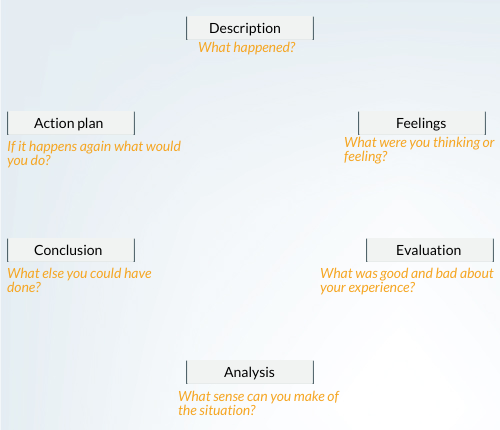
Best guide to Reflective writing
Reflective writing has become common these days to many courses that involve practical-based activities such as social work, teaching, and nursing. Looking at this increase in the number of courses, students are often asked for assignments that are written reflectively. Reflective writing can be required for some occasional purposes, or it can be a core feature of most of the assignments.
Reflective writing benefits from an appropriate reflective cycle that can help you to write about the situation and what was learned. It consists of thinking critically about the experience and learning from it by-
- Exploring the experience in terms of feelings and emotions
- Processing significant features and identifying learning
- Trying to find new solutions to your dilemmas
- Using the process as a tool to help develop future practices
Therefore, reflective writing-
- Records your future reading and how you feel about an experience before, during and after the event
- Provides you a way of generalizing feelings about some specific event that is similar to other situations and events
- Allows the person to relate his feelings and experiences with other’s perspectives
- Enables him to stand back and evaluate his feelings
What is Reflective Writing?
Reflective writing is an evidence of reflective thinking. As per the academic context, reflective thinking usually involves-
- Looking back at some event or situation that has happened before
- Analyzing that event or idea and thinking about it in-depth
- Think carefully about the event or idea and what it means to you
Thus, reflective writing is considered to be more personal as compared to the other kinds of academic writing. We all think reflectively in our everyday lives, but perhaps not to the same depth that is expected in a good reflective writing at university. This type of writing comes into practice when an individual is asked to reflect upon and think essentially about some objective or practices. The main purpose of this writing is to assist you in enhancing your understanding of the course material or guide you to make links between your previous and present learning. Reflective writing enables you to write paragraphs in accordance with your opinions and then support them with some evidence.
Characteristics of Reflective writing
- When you write a reflective assignment, you are entitled to write in the first person. This simply implies that you can incorporate yourself while expressing some personal experiences, views, or thoughts.
- It is important for you to write in the third person when you refer to some theories or views of other writers. This implies that you need to refer to those writers other than yourself.
- If you find your opinion to be not convincing for reflecting, you can adjust and soften your action with words like may, right, and perhaps.
How can the Reflective writing be structured?
Many schools usually recommend using a reflective cycle such as Gibbs (1988) or Kolb (1974) for writing. These are the ways that help you organize your thoughts so you can critically analyze the event or feeling into a coherent piece of writing. This helps you to produce writing that is more analytical and the one that goes beyond descriptively recording what happened.
Whichever cycle you use, each one of them has three main elements. These three main elements often comprise some stages that put your feelings and actions into context and urges you to think about the experience.
What? (Description)
- What was the event?
- When?
- Where?
- Who was involved?
- What is being examined?
So what? (Interpretation)
- What is the most important aspect of some event, situation, or idea?
- Why did this occur?
- How can you explain the event and your feelings about it?
- Could anything have gone wrong or differently?
- How can you relate the stages of event to each other?
- How is it similar to and different from others?
Now what? (Outcome)
- What have I learned from this?
- What are the implications for my future practice?
This is just one way of structuring your reflective writing. There are others as well that may be required to follow a particular model. Whichever approach you use for reflection, try to bear in mind the following four key points-
- Reflection is considered to be an exploration and explanation of events, not just a description of them.
- Reflective writing often involves revealing, errors and weaknesses, anxieties, as well as strengths and successes. This is fine up to the mark, as long as you show some understanding of possible causes, and how you plan to improve them.
- It is necessary for you to select just the most significant parts of the event or idea that you are trying to reflect. If you narrate the whole story, then you are likely to use up words for description rather than interpretation.
- It is often suggested that you use the aspects of ‘reflecting forward’ to the future as well as the ones from the past (reflecting back).

